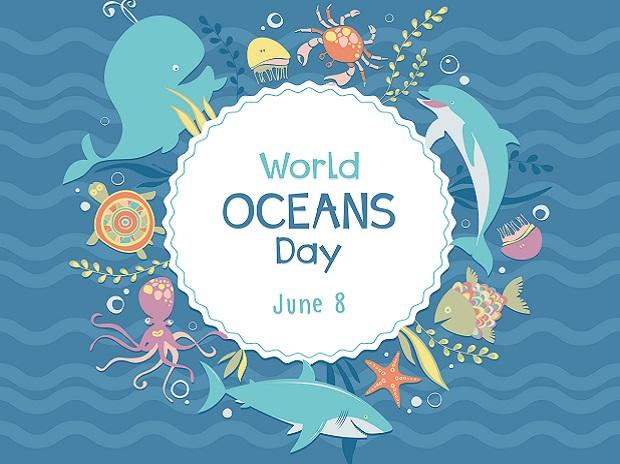The United Nations and international law observe June 8 as World Oceans Day to celebrate the role of the oceans in supporting life. This year’s theme is ‘life and livelihoods’

Dr ALVARINHO J LUIS
The ocean, which is derived from the Greek word Ōkeanós, is the largest body of seawater that occupies 71% of the earth’s surface. Though ocean is one, it is geographically divided into 5 distinct basins: Indian, Atlantic, Pacific, Arctic, and Southern Oceans, with some hypothetical boundaries that have evolved over time for a number of historical, cultural, geographical, and scientific reasons. These basins form an integral part of hydrosphere which regulate the carbon cycle, influence weather patterns, supplies oxygen, provides sea/marine resources, act as sink/ source of carbon dioxide, hosts 2,00,000 known marine species, and supports the blue economy. So to celebrate the role of the oceans, the United Nations and international law observe June 8 as World Oceans Day. The theme for World Oceans Day 2021 is the Ocean: life and livelihoods.
Man has been overexploiting the resources from the oceans by using all possible means, and also polluting the marine environment. The United Nations Food and Agriculture Organization estimates that 31.4% of fish stocks are either fished to capacity or overfished. In many areas, factory fishing (huge trawlers with fish processing facilities onboard) has destroyed local fish stocks, leaving too few adults to breed for the future. Certain fishing practices also damage the marine environment by dredging the seabed or catching other species that are thrown back dead. Some solutions are the designation of specially protected areas to reduce destructive trawling fishing, help fishermen to maintain their livelihoods by adopting conservation efforts, and installing measures to reduce the amount of fish caught accidentally.
Since the industrial revolution, anthropogenic activities have pushed up atmospheric carbon dioxide to levels that have caused ocean acidification and ocean warming, amongst other climate-related negative effects. A 0.13 deg C per decade increase in the ocean water temperature over the past century is enough to kill the algae that keep corals alive, species migrate to new areas, and cause sea levels to rise. Like warming, acidification is related to carbon dioxide, which dissolves in oceans to form carbonic acid. Higher the acidity poor is the ability for calcifying species to make their shells, reefs, and exoskeletons, which disrupts their reproductive process. The solutions are to use electric vehicles, switch to solar power, and use petroleum-free beauty products.
As glaciers and sea ice melts and drains into the ocean, it changes the layering in the upper ocean (stratification), leading to disruption in weather patterns worldwide, changes in ocean currents and circulation. This moves not only animals and plants around the ocean but also redistributing heat and nutrients. Changes to the physical environment will in turn create changes in the abundance, health, and distribution of marine populations. For example, finfish such as tuna will migrate poleward toward cooler waters leaving fisherman near the equator disadvantaged.
Vast quantities of plastic pollute our oceans, damaging ecosystems and entering the food chain. Turtles, dolphins, and seabirds can mistake it for food or become entangled and injured. Plastic has been found in the oceans as deep as 11 km. An estimate suggests that by 2050 there will be more plastic in the oceans than fish (by weight). The solution is to ban single-use plastic items like straws, drink stirrers, and cotton buds. Limit the use of plastic to reduce your personal plastic footprint. Govt should hold corporations accountable for the collection and disposal of soft drink bottles.
While marine habitats deal with the pressure of coastal pollution, most notably coral reefs, there are other ways we are systematically destroying the ecosystems that marine plants and animals need to survive. These include clearing mangrove forests for shrimp production and scraping entire ecosystems off underwater mountain ranges, through deep-sea trawling. Coral reefs face a variety of stressors: unsustainable tourism, rising water temperatures, pollution, and overfishing, which culminate in coral bleaching - a process that eventually kills the reefs. Virtually all ocean habitats have been affected in some way via drilling or mining, dredging, destructive anchoring, removal of corals, and land reclamation. Solutions are to carry on limited fishing in the coral reefs, and avoiding water sports and anchoring of boats in these habitats.
Excessive use of chemical fertilizers in agriculture and untreated industrial sewage is draining nitrogen and phosphorous into the oceans through the rivers. These nutrients feed the uncontrolled growth of an organism called cyanobacteria, or blue-green algae (eutrophication) which depletes the dissolved oxygen (DO). Once DO in a body of water drops below 0.5 ml O2/liter, mass mortality occurs. Solutions are to use bio-fertilizers in agriculture and impose heavy penalties on polluting industries.
Oil drilling and laying pipelines to transport oil to shore can cause oil-related catastrophes. Oil spills account for 10% of marine oil pollution caused largely by shipping and oil drilling. Our dependence on oil is killing fish, mammals, and seabirds and is destroying entire ecosystems. Although marine oil pollution has decreased in recent decades, decisive action is needed to combat this issue. A recent incident of a chemical-laden cargo ship sinking off the coast of Sri Lanka is a concern because tonnes of oil from fuel tanks could leak into the sea, devastating marine life. The solution is to reduce our dependence on oil by switching over to renewable sources of energy. We need to seriously implement sustainable strategies to protect and conserve ocean habitats from further damage and extinction.